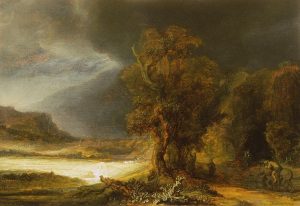The biblical structure of blessings and punishments (curses) characterizes the ending of the Book of Leviticus and can be found once more in the Torah in the Book of Deuteronomy. In both references in the Hebrew Bible, we notice that the ‘land’ plays an important role. Let’s have a look at the following verse:
“I will give peace in the land, and you shall lie down, and none shall make you afraid. And I will remove harmful beasts from the land, and the sword shall not go through your land.” (Leviticus 26:6)
The original Hebrew word for ‘land’ is ‘eretz’ (ארץ) and this word has a deeper meaning than just simply ‘land’ in Hebrew. For example, this word appears in the opening verse of Genesis:
“In the beginning, God created the heavens and the EARTH.” (Genesis 1:1)
There, the English translation (which was influenced from the old Latin translation – translated this Hebrew word as ‘terram’) chose the English equivalent word ‘earth’. In fact, the Hebrew term for ‘planet earth’ is ‘Kadur Ha-Aaretz’ (‘Kadur’ {כדור} means ‘ball’ or ’round’ in Hebrew).

That means that the Hebrew word ‘Eretz’ can also be understood as referring to the ENTIRE land, or in other words, to the ALL world. So now when we read this verse from Leviticus:
“I will give peace in THE LAND, and you shall lie down, and none shall make you afraid. And I will remove harmful beasts from THE LAND, and the sword shall not go through YOUR LAND.” (Leviticus 26:6)
We can notice that ‘the land’ actually refers to the ENTIRE land meaning all the world, but the last part – ‘your land’ – refers ONLY to the land of Israel (*in the original Hebrew appears as ‘Artze’chem’ {ארצכם} meaning ‘your {plural} land’). In other words, the ‘peace’ and the ‘removal of harmful beasts’ is for all the countries in the world but ‘the sword shall not go through YOUR LAND’ is talking only about the land of Israel.
If there is peace in all the world, as mentioned in the first part of the verse (‘I will give peace in THE LAND’), why there is a need to emphasize that ‘the sword shall not go through YOUR LAND?’ Is it not clear enough?
The answer lies in the deeper Hebrew meaning of the word ‘sword.’ The Hebrew word for ‘sword’ is ‘Cherev’ (חרב) and it derived from the Hebrew root CH-R-V {ח-ר-ב} which means ‘destruction’, ‘ruin’ or ‘desolation’. Yes, this is the same Hebrew root which was used to describe the destruction of the Temple in Jerusalem (‘Churban’ {חורבן}).
If we take a closer look at the biblical structure of the blessings and punishments (curses) we will see that there is a correlation between the two lists (blessings and curses). Which means that if there is a ‘sword shall not go through your land’ blessing, then there is a parallel punishment (curse) that suggests a ‘destruction’, ‘ruin’ or ‘desolation’ of the land of Israel, as can be found in the following verse:
“And I will scatter you among the nations, and I will unsheathe the sword after you, and your land shall be a desolation, and your cities shall be a waste.” (Leviticus 26:33)
